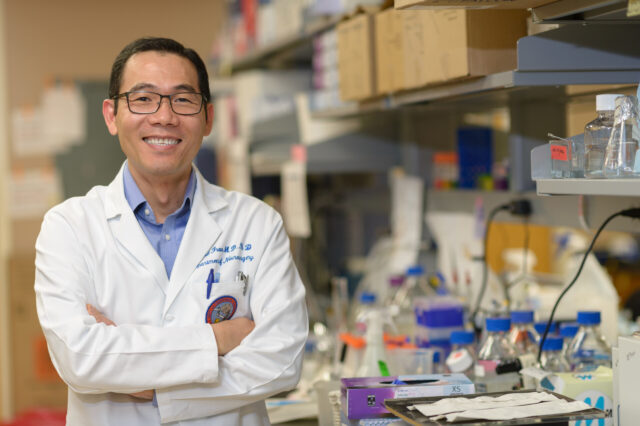Targeting wayward tumor cells in triple-negative breast cancer

University of Florida Health neuro-oncologist David Tran, M.D., Ph.D., has been awarded a $1.78 million grant from the Florida Department of Health’s Bankhead-Coley Cancer Research Program to develop new strategies to target disseminated tumor cells in triple-negative breast cancer.
Tran, chief of the neuro-oncology division in the UF College of Medicine’s department of neurosurgery, began the five-year study in March. Here, Tran elaborates on his research:
Q. What is the focus of your study?
A. There is a phenomenon commonly observed in many different cancers called tumor dormancy. At the time of diagnosis, the patient doesn’t have clinical evidence of metastatic disease. But if you look hard enough, you can find cancer cells hiding in distant locations far away from the original tumor. Sometimes they are found floating in the blood or the bone marrow. They’re very rare, present in a ratio of a few cells per million of normal cells. These cancer cells can stay dormant in distant sites such as in the lung, liver, bone or brain, for months, and sometimes years or decades, and not do anything. The patient finishes treatment, and then comes back many months or years later with widespread metastatic disease. The problem is we don’t actually know how to eliminate these cells. It’s very difficult to get rid of them because they divide very slowly. Most chemotherapy kills cells that are fast-dividing. These cells basically escape under the radar of chemotherapy.
Q. Who is most at risk?
A. The grant is focused on a group of people in which this phenomenon occurs frequently: triple-negative breast cancer patients. These patients have a very aggressive type of breast cancer. If they have cancer cells remaining after initial standard chemotherapy and radiation therapy, these patients are at exceedingly high risk of developing metastatic disease, including brain metastasis, within two years of diagnosis. Although triple-negative breast cancer accounts for only 20 to 30 percent of all breast cancer, it disproportionately contributes to metastatic disease, including the majority of breast cancer-related brain metastasis and death.
Q. What method are you testing to combat tumor dormancy?
A. We are developing a treatment technology in the lab to activate these slowly dividing cells to render them sensitive to chemotherapy. If we can make the cells divide faster by forcing them out of quiescence, we postulate that we can make them more sensitive to treatment. The Bankhead-Coley grant is supporting us in testing this technology using a new class of drugs, developed to block a signaling pathway that is critical in maintaining these slowly dividing tumor cells, to reactivate these cells and then kill them with chemotherapy. The trial will test to see which regimen is best in controlling these disseminated tumor cells. In addition, we will perform comprehensive gene analyses of tumor samples collected from patients in this study. The goal is to identify all important genetic and non-genetic mutations in slowly dividing cancer cells to better understand how they stay quiescent for so long and to identify new targets to further improve the technology.
Q. Who can participate in the trial?
A. For the smaller early phase of the study, patients with metastatic breast cancer of any type who have undergone all available standard treatment can participate. In the later stage of the trial, only patients with triple-negative breast cancer who still have cancer cells remaining after initial aggressive therapy and whose disseminated tumor cells have activated the dormancy pathway will be eligible to enroll. The proportion of these patients who have cancer cells remaining after aggressive therapy is about two out of three. These patients have a very high risk of developing metastatic disease and currently there is no treatment proven to lower this risk.
Q. Who are your co-investigators?
A. Karen Daily Weinstein, D.O., a clinical investigator and a board-certified breast medical oncologist in the UF Health Cancer Center, will serve as the study’s principal investigator, and UF Health medical oncologist Coy Heldermon, M.D., Ph.D., is the co-investigator.
Q. What is the potential impact of the study?
A. Currently there is no known therapy after surgery that can lower metastatic risks in patients with high-risk breast cancer, and the standard approach often entails watchful surveillance only. Once metastatic disease takes hold, long-term survival is rare. It is clear that current standard procedures are inadequate and innovative approaches are needed to improve survival. To that end, positive results from this study will have the potential to lead to a paradigm shift in how tumor dormancy is managed in the clinic and build the foundation for a more comprehensive approach to significantly reduce risks of recurrence and hopefully achieve a cure for these patients.
About the author
